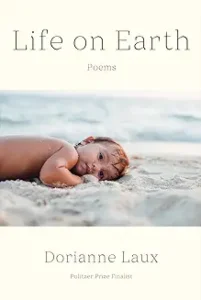Life on Earth: Poems by Dorianne Laux 2024
From time to time, I will read a book of poems and want to copy each and every one of them in my book review. Such was the case with “Life on Earth”.
I had read and loved one of Laux’s earlier volumes, “Facts About the Moon” ten years ago, but had not seen any new books by her since then until I came across this volume in the New Book section of the Boston Atheneum. I’m grateful that I did.
Laux, unlike many better-known American poets, doesn’t teach at a university or have a long list of awards, prizes, etc. To be sure, she has been a finalist for a National Book Critics Circle Award and has rceived other notice, but she, like her poems, is quiet yet powerful. The Poetry Foundation bio describes her free-verse poems as “sensual and grounded, and they reveal the poet as a compassionate witness to the everyday.”
I thoroughly enjoyed this book and recommend it highly especially for those who usually shy away from poetry. Her poems are accessible, and the themes/ideas/descriptions all spoke to me—the changing seasons, history, wonder, awe, gratitude, family, death. From her poem about WD-40 oil (“It was the answer to everything:/releasing a zipper, removing/carpet stains or scuff marks/from a linoleum floor,unleashing/a wad of gum from a hank of hair,/shit from a shoe, prevent snow/from slowly fatteningon a windowsill./Anything that adhered, was frozen, jammed, lodged, wedged,/clogged, crammed, shoved or twisted/too snug, fastened/attached. No glue/too super. No union/til death do us part.”), to her poem about aging entitled “I Dare You” which I am moved to include in its entirety as follows:
“It’s autumn, and we’re getting rid/of books, getting ready to retire,/to move some place smaller, more manageable. We’re living in reverse,/age-proofing the new house, nothing/on the floors to trip over no hindrances/to the slowed mechanisms of our bodies, a small table for two. Our world is/shrinking, our closets mostly empty,/gone the tight skirts and dancing shoes/the bells and whistles. Now, when/someone comes to visit and admires/our complete works of Shakespeare,/the hawk feather in the open dictionary,/the iron angel on a shelf, we say/take them. This is the most important/time of all, the age of divestment,/knowing what we leave behind is/like the fragrance of blossoming trees/that grows stronger after/you’ve passed them, breathing/them in for a moment before/breathing them out. An ordinary/Tuesday when one of you says, I dare you, and the other one/just laughs.”
I love this poem and found it so much richer while copying it than I did upon first reading it. Read Laux for joy, for beauty, and for the comfort of knowing that we are all in this together.



